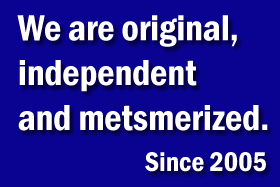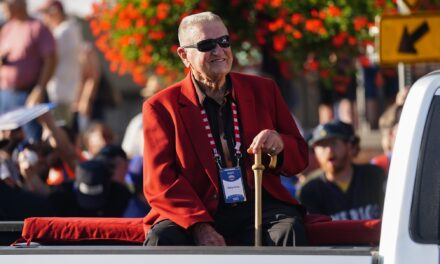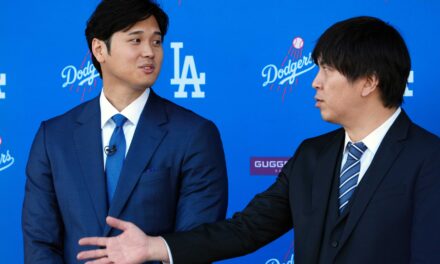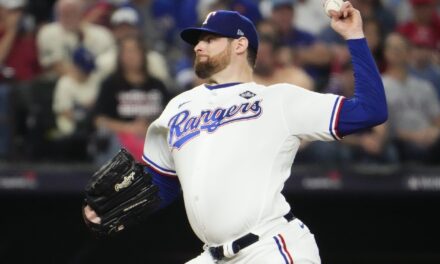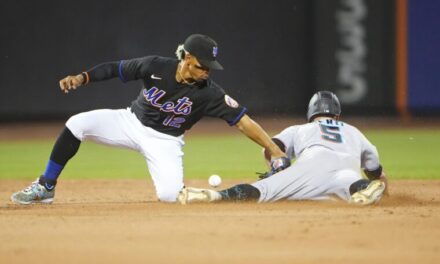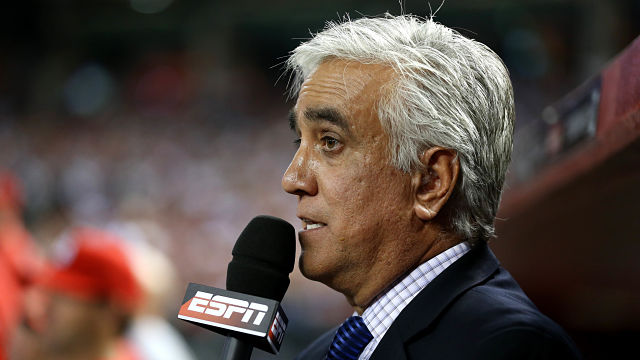
“I’m just heartbroken, like a lot of people,” said Jayson Stark, “but everybody in baseball loved this man.”
When I spoke to Tim Kurkjian on Monday afternoon, he opened our call by stating he’s “been better, I will say. This has been a very very difficult last 24 hours… we’re doing the best we can, but this one really, really, hurts.”
The baseball world mourned late Sunday night after ESPN announced the passing of longtime baseball reporter Pedro Gomez. Gomez, 58, died suddenly on Sunday in his home. Gomez, a proud descendant of Cuba, was a baseball aficionado, covering 25 World Series and 22 All-Star Games. His career in sports lasted over three decades, including his final 18 at the World Wide Leader in Sports, ESPN.
Gomez was universally loved by all, from the fans at home to those who worked closest to him. “Pedro epitomized passion for his job. He always had a smile on his face,” said a former Coordinating Producer on Baseball Tonight, “even on the days he was grilling Barry Bonds about BALCO. We were lucky to have Pedro on the Bonds Beat the year Bonds broke the HR record. It was a grind for Pedro but he was a true pro every day. And MLB was lucky to have Pedro cover their sport for as long as he did.”
“What I’ll always remember about him is how fearless of a reporter he was,” said ESPN Reporter Tim Kurkjian. “When [Gus Ramsey] was running baseball at ESPN, Pedro and I were reporters. Somebody had to go into the winning locker room, and somebody had to go into the losing locker room. That losing locker room, no matter what game it is, that is a tough place to be, but Pedro always volunteered to take on the losing locker room.” Gomez was always willing to take the tougher road, especially when no one else wanted to. He was fearless.
Gomez made his mark on the national baseball scene when he was assigned to cover Barry Bonds as he chased the all-time home run record. “I’m sure it was difficult,” Kurkjian said, “His kind-hearted nature, I’m sure, made it difficult some days.” “I think Barry Bonds, in the end, had some real respect for Pedro Gomez because he showed up every day, and there’s something to be said for that.” Gomez followed Bonds on the “Bonds Beat” for three years as he chased Hank Aaron‘s record.
Similarly to Kurkjian, Stark and Gomez met long before their paths crossed at ESPN. Jayson, like many others in baseball, speaks with the utmost praise of Gomez and his time in baseball. “Pedro was just one of those people. People gravitated to him,” said Stark. “He had this smile, this spirit about him. He had this ability, because of that, to break down the barriers that exist between people in baseball and people in the media, or just people in general.”
Gomez’s character is arguably what is spoken of most highly when you talk to those in baseball. “He connected with everybody, and he cared about everybody. Jack, I think there must be 500 people walking around planet earth who think of Pedro as one of their best friends, and I’m one of them,” Stark continued.
One of the highlights of Pedro’s career came in 2016 when he covered the Tampa Bay Rays and their exhibition against the Cuban National Team. Gomez was able to return to the country from which his father was born. Cuba was the same country his parents eventually fled from in favor of the United States. In a spot with Scott Van Pelt on SportsCenter, Gomez spoke on how he was able to spread the ashes of his father back in his home country. Gomez’s father, who said he wouldn’t return to Cuba until the end of the Castro regime, passed in 2004 and was never able to return.
“In 1999, we were both in a group of baseball writers to cover the Orioles, when they were the first Major League team to go to Cuba since Castro came into power,” said Stark, speaking on just how much Gomez’s Cuban heritage meant to him. “You’ll never guess what I’m doing today!” Gomez would exclaim to Stark. “‘I’m going back to the neighborhood where my family once lived before they left for the United States because I want to retrace my roots’ and he had this excitement in his voice, and it just gave me chills.”
Gomez’s ability to enter a locker room and fluently speak both English and Spanish did not go unnoticed or under-appreciated. “It was critical,” said Kurkjian when asked about how important Gomez’s bilingual nature was for Spanish speaking players who struggled with English. “When he went to Cuba on the second trip, and I know because I went with him, no one else could do that job because no one could speak the native language like he could.” “Being Cuban ran through his coverage of baseball because he had that natural connection with all the great Cuban stars that came to the States.
For anyone who was close with Pedro in the baseball world, you knew just how proud Gomez was that his son, Rio, had been drafted by the Red Sox and had made it up to Advanced A-Ball. “He spoke about them all the time,” said Stark of Gomez’s family. On his son Rio, Stark was heavy-hearted in the “thought that I can’t get out of my head today, Jack: Pedro covering the big league debut of his own son. I don’t know how many times I’ve used the term heartbreaking today, but it hurts me so much that he wouldn’t be there to see that.”
“He was such a proud father,” said Kurkjian, “he used to send me these updates, sometimes a one-liner, all the time.” Kurkjian then proceeded to tell a story he had of Rio, Pedro, and himself from Red Sox camp a few years back: “When [Rio] was in camp, I went because it was his first camp. It was minor league camp and it was his first time wearing a Red Sox uniform. Of course, I tracked him down, talked to him, and we did a little video thing on my phone and it was great. There I am sitting and talking to Pedro Gomez’s son.” Kurkjian continued, saying “Pedro then called me and said ‘I can’t believe it, you interviewed my son before I did!’ and we had a great chuckle over that. Again, Pedro had a great laugh and he wasn’t afraid to use it.”
The one thing Kurkjian wants people to remember about Pedro Gomez? “No story was too big for him, but neither was any story too small.”
Arguably the most respectable thing said to me about Gomez was from a current Major League manager to ESPN Coordinating Producer, Pete McConville, who said “He called me and told me ‘He was one of the nicest, fairest human beings I’ve ever met.’ In the end, he was fair. He stood up for people when he felt the need to, but also wasn’t afraid to tell you when you were wrong.” McConville recalled an article Gomez wrote for the Arizona Republic in the late ’90s detailing how a number of Curt Schilling‘s teammates didn’t enjoy being around him on the days he was not starting. “The column basically said ‘Every fifth day, Curt Schilling is the best teammate any Diamondback could have… but you have to deal with him the other four.'” McConville continued that “Pedro wrote it, and walked right into the clubhouse and went right up to Schilling and tell him ‘I wrote it. If you’re going to blast anyone direct it at me’ and man, Curt did. He let him have it and told him how he thought it was B.S.”
Gomez and Schilling would go on to work on Baseball Tonight together when Schilling joined ESPN in 2010. “When Pedro first walked into the room where we’re working on the [the show], the first words out of Schill’s mouth weren’t ‘hey man, how ya doing?’, but was ‘Hey Pedro, are you still writing bullshit about people?’ and man, Pedro fired right back at him: ‘Curt, what was I wrong about?'” McConville then went on to talk about how Gomez and Schilling would get along with each other after the first spat, speaking to the respect Gomez received from not just players in the clubhouse, but as they came and went in through the different channels of life.
McConville, a producer, never made it in front of the camera. “It didn’t matter who you were; Pedro treated you the same. That’s just who he was. The same person that spoke to me and [Gus Ramsey], is the same person who spoke to Aaron Boone and Barry Larkin. With some people, there is a difference, yeah, but with Pedro, there was none of that. He was the real deal.”
On a personal note, Pedro Gomez truly was a light in a world that sometimes could become dark. Gomez and my father worked on seven different playoffs at ESPN together, and several years on Baseball Tonight. Over the years, I would hear stories about Gomez from my father and those who worked with them. I had spent considerable time at the Mother Ship — how Dan Patrick refers to ESPN — as a child and had met Pedro in Bristol before. From time to time, you get to see the impact people have on the industry around them: Stuart Scott was one of those people. Much of the same, so was Pedro.
I reached out to my father after learning of Gomez’s passing to check in on him. Of Gomez, he said “I just saw. He loved his job and loved the game. Terrific guy. [We talked] every postseason I covered. Seven of them plus he did live shots on my shows all the time and I always talked with him on the headsets beforehand.” The more you ask around baseball, the more stories you find like the ones my father had to share. Whether from his days on the beat in Arizona, or to his time on top of the national reporting scene following Bonds, Gomez had a profound love and admiration for the game that had given him so much, and he tried like hell to pay it back to the game.
It was no secret that Pedro Gomez loved baseball, but baseball loved Pedro so much more than anyone could know.
